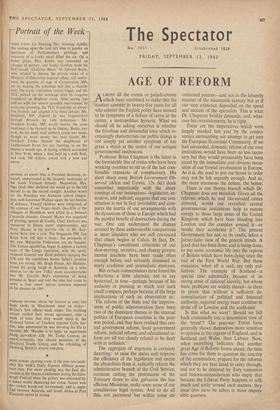AGE OF REFORM
ALMOST all the events or pseudo-events which have combined to make this the nastiest summer in twenty-five years for all who admire the English polity have seemed to be symptoms of a failure of nerve at the centre, a metropolitan hysteria. What we should all be asking ourselves is whether the frivolous and distasteful tone which in- creasingly characterises our public doings is not simply yet another symptom of too great a strain at the centre of our antique governmental institutions.
Professor Brian Chapman is the latest in the formidable line of critics who have been working overtime to rid us of the last com- fortable remnants of complacency. His short sharp essay British Government Ob- served (Allen and Unwin, 12s. 6d.) deals somewhat impatiently with the short- comings of our institutions—legislative, ex- ecutive, and judicial; suggests that our con- stitution is not in fact inviolable; and com- pares the inertia of our arrangements with the dynamism of those in Europe which had the painful benefit of destruction during the war. One can understand the dismay aroused by these unfavourable comparisons in stout islanders who are still convinced that chaos begins at Calais. In fact, Dr. Chapman's constituent criticisms of our slow-moving, secretive, and clumsy govern- mental machine have been made often enough before and seriously discussed in many academic and journalistic exercises.
But certain commentators have found his reflections a little alarmist, not to say hysterical, in tone—perhaps because of his audacity in pressing so much into such small compass, perhaps because of the large implications of such an observation as: `The reform of the State and the improve- ment of public administration have been two of the dominant themes in the internal politics of European countries in the post- war period, and they have realised that cen- tral government reform, local government reform, judicial reform, and educational re- form are all too closely related to be dealt with in isolation.'
The aggregate of urgencies is certainly daunting : to raise the status and improve the efficiency of the legislature and excise the absurdities from it, radically reform the administrative branch of the Civil Service, continue cutting the pretensions of the Treasury down to size, galvanise the less efficient Ministries, make some sense of our antediluvian legal system. And to do all this, not piecemeal but within some co- ordinated pattern—and not in the leisurely manner of the nineteenth century but as if our very existence depended on the speed and success of the operation. This is what Dr. Chapman briskly demands, and, what- ever his overstatements, he is right.
These are the imperatives which were largely masked last year by the contro- versies surrounding our attempt to get into the European Economic Community. If we had succeeded, domestic reform of our own institutions would have been no less neces- sary but they would presumably have been eased by the immediate and obvious neces- sities of our formal involvement in Europe. As it is, the need to put our house in order may not be felt urgently enough. And so, the more strenuous the debate, the better.
There is one thorny branch which Dr. Chapman does not brandish. Given all the reforms which he and like-minded critics demand, would our revivified central governmental institutions help to restore energy to those large areas of the United Kingdom which have been bleeding into London and the complex around it—or would they accelerate it? The present Government has not, to its credit, taken a laissez-faire view of the general trends. A good deal has been done, and is being done, to put some economic life into the regions of Britain which have been dying since the end of the First World War. But these measures, when all is said, are only pal- liatives. The example of Scotland—a special case admittedly, because of its strong sense of national identity, but whose basic problems are widely shared—is there to prove that without a sufficient de- centralisation of political and financial authority, regional energy must continue tO drain off to London and the south-east.
Is this what we want? Should we fall back contentedly into a determinist view of the 'trend'? The post-war Tories have generally shown themselves more sensitive to opinion in the regions of England, and in Scotland and Wales, than Labour. Now, when everything indicates that another great Age of Reform looms ahead, the time has come for them to question the sanctity of the constitution, prepare for the reforms which they are best fitted to carry through, and not to be deterred by Tory romantics and historic-necessitarians who imply that because the Liberal Party happens to talk much and airily around such matters, they must ipso facto be taboo in more respon- sible quarters.






























 Previous page
Previous page